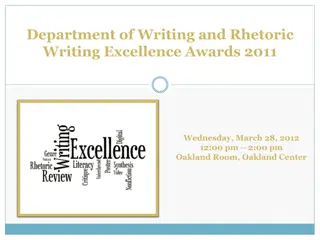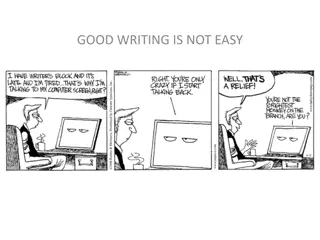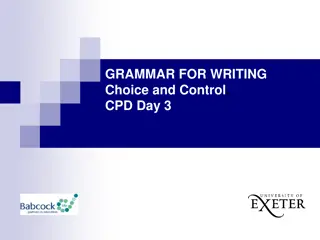Levels of Reflectiveness in Learning and Writing
Explore the levels of reflectiveness in learning and writing, starting from habitual actions to profound reflections. Understand the progression from providing material without meaning to critical analysis and personal interpretation. Discover the importance of relating concepts to experience and challenging assumptions for deep learning. Kolb's Experiential Learning Cycle and tips for achieving Level 6 writing are also highlighted.
Download Presentation

Please find below an Image/Link to download the presentation.
The content on the website is provided AS IS for your information and personal use only. It may not be sold, licensed, or shared on other websites without obtaining consent from the author. Download presentation by click this link. If you encounter any issues during the download, it is possible that the publisher has removed the file from their server.
E N D
Presentation Transcript
Levels of Reflectiveness (1) 1. Habitual action: providing material without any sense of the meaning. 2. Understanding: can demonstrate understanding but has difficulty applying it because it remains a theoretical concept and does not show how it might be used in practice.
Levels of Reflectiveness (2) 3. Reflection: can relate concepts and ideas to own experience, and writing is illustrated with examples from practice. 4. Critical reflection: this implies a change or transformation of perspective. Recognises own assumptions and can critically review them. Kember et al (2008)
Profound reflection: (Moon, 2001, pp.3-4) Is there relevant formal theory? Are there ethical / moral / wider social issues to explore? How are your perceptions of the issue present in your writing? Are there alternative interpretations or different points of view to consider? In what way(s) might you have tackled the task differently? If you step-back from this issue, does it look different? Are you aware of your feelings changing over time possibly in the course of writing?
Kolbs Experiential Learning Cycle Adapted from KOLB, D. (1984) Experiential Learning New Jersey: Prentice Hall Concrete Experience The Planning Personal Reflection Learning Cycle and Experimentation Critical Analysis
Level 6 writing: the essential elements Careful explanation, showing understanding of the complex terminology used Extensive use of literature to support the ideas being presented A linking, conversational style, which shows the student s own interpretation of what they have read and how it informs the argument being presented.
are: Individual issues are explored in considerably more depth. (It is essential, therefore, in Level 6 writing to focus on a few key issues, so that they can be explored in sufficient depth within the available word allowance). The student should constantly be trying to find answers in the literature, particularly finding different definitions and interpretations of key issues Once the literature is presented, the student puts their own spin (interpretation) on it Personal thoughts and reflections are always followed up by attempts to find supporting evidence (substantiation) in the literature The complexity of the issue is recognised. Things are not presented simplistically as black and white . Instead, shades of grey are acknowledged. The student s voice is heard throughout, trying to make sense of what they have read and comparing it with what they have experienced.























